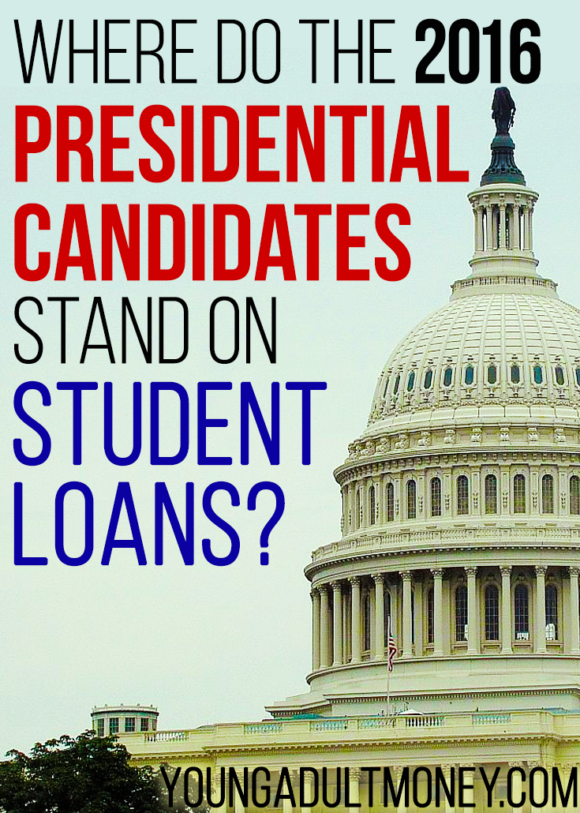 This post is written by our regular contributor, Kristi.
This post is written by our regular contributor, Kristi.
The 2016 Presidential Campaign is in full swing, with the Iowa caucus in the books and the New Hampshire primary taking place tomorrow.
The candidates are everywhere, figuratively and literally, on the news, in the media, and even in social media trying to convince you that they represent the best choice for the next president of the United States.
While tax reform, job creation, immigration, foreign wars, and abortion are still mainstay issues for most of the presidential candidates, a new hot-button issue has emerged that we haven’t really seen as strongly in a presidential contest before.
Student loans, student loan reform, and the possibility of making college tuition less costly or even free for all students, has taken center stage. Millennials, the most debt-burdened students in history, are demanding answers.
We want to know: What is your stance on student loans and student loan debt? Are you going to do anything to fix our massive student loan debt problem in the United States? How can we change things to make college a financial reality the next generation?
The following is an unbiased, fact-based listing of the 2016 Presidential candidate’s stance (or lack thereof) on student loans and student loan debt.
Ted Cruz
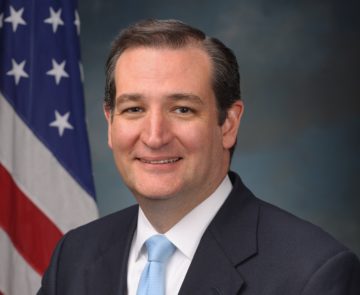
In his own words, Ted Cruz’s plan as president is as follows, “During my first year, I will fight to abolish the IRS, the Department of Education, the Department of Energy, the Department of Commerce, and the Department of Housing and Urban Development.”
Ted Cruz’s stance appears to lean more towards job creation.
Donald Trump
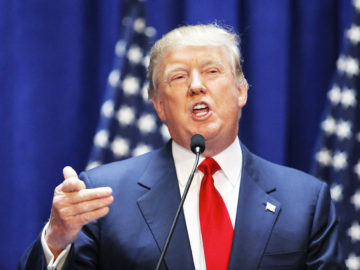
In an interview with The Hill, for example, he said, “One of the biggest questions I get is from people in college [about student loans]. They’re in college — they’re doing well but they’ve got student loans up to the neck. They’re swimming in these loans.”
He has since gone on to say that he’ll “fix the problem” but has yet to offer any concrete details on his official campaign website. His student loan plan seems to lean more towards job creation instead of loan management, reduction or revamping of our Federal Loan process.
Marco Rubio
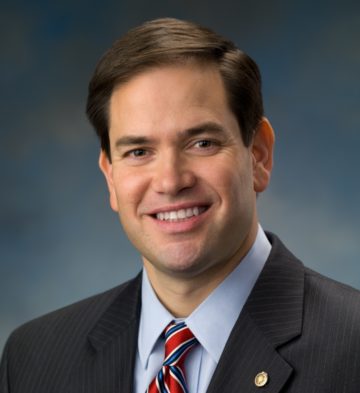
- Consolidate the higher education tax incentives into one provision
- Reduce the complexity of the federal financial aid application
- Reduce the burden of student loan debt by establishing an automatic income-based
- Allow students to apply for “Student Investment Plans” from approved investors to help Americans finance postsecondary education without taking on the burden of student loans.
- Establish an accountable framework for students to repay loans based on what they earn after college.
Jeb Bush

- Replace the current federal loan program with an entirely new, income-based financing system that gives students ownership of their student aid and the flexibility to plot their own individual educational path
- Provide all high school graduates access to a $50,000 line of credit through their Education Savings Account. Students would repay this debt by contributing a percentage of their incomes proportional to the amount spent—1% for every $10,000 spent—through their federal income taxes for 25 years.
- Give low-income students, in addition to the $50,000 line of credit, access to an improved need-based Pell Grant through their Education Savings Account.
- Drive down costs and hold post-secondary institutions accountable by forcing them to share the risk of failure with students, thereby incentivizing them to reduce costs, boost quality and ensure that students graduate, find a job and have the skills needed to succeed.
- Give students and families the information they need to make good decisions through the creation of state databases that make information on student outcomes (retention, completion, unemployment, earnings, etc.) available to the public.
- Help existing borrowers successfully repay their loans by allowing them to transfer into the new income-based repayment system.
- Make federal debt collection more transparent, simple and fair and allow private student debt to be discharged in bankruptcy, extending the debt repayment period and easing transition into the existing REPAYE
Ben Carson
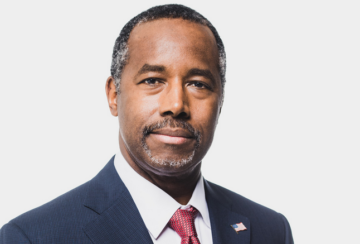
- Use market-oriented solutions to reduce tuition costs and alleviate student loan debt.
- Develop an approach that reflects the American values of free market competition and consumer choice.
- Provide parents and students clear, easy-to-understand information about repayment rates and future earnings projections in their chosen fields of study.
- Simplify and streamline the financial aid system to make it easier for students and families to make informed decisions.
- Reverse President Obama’s nationalization of the student loan market and welcome private sector participation in providing information and financing.
Hilary Clinton

- Ensure that no student has to borrow to pay for tuition, books, or fees to attend a four-year public college in their state.
- Enable Americans with existing student loan debt to refinance at current rates.
- Hold colleges and universities accountable for controlling costs and making tuition affordable
- Close corporate tax loopholes to pay for her plan
“We need to make a quality education affordable and available to everyone willing to work for it, without saddling them with decades of debt,” Hilary Clinton, August 10, 2015.
Bernie Sanders
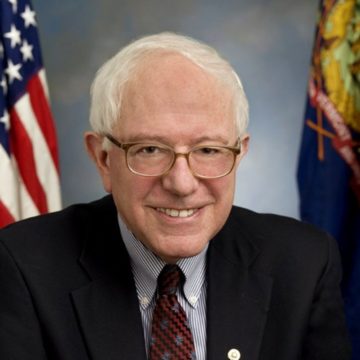
- His plan is to make tuition free at public colleges and universities.
- Stop the Federal Government from making a profit on student loans.
- Substantially cut student loan interest rates.
- Allow Americans to refinance student loans at today’s low-interest
- Allow students to use need-based financial aid and work study programs to make college debt free.
- Make college fully paid for by imposing a tax on Wall Street speculators (a $75 billion dollar a year plan).
Student loan debt is an issue that is not going away anytime soon. With college students graduating with higher and higher levels of student loan debt, it’s only going to become a bigger issue in Presidential races.
Check out DC’s new book Hustle Away Debt to learn everything you wanted to know about making money through side hustles!

Does a candidate’s stance on student loans or debt matter to you? What are you looking for in a candidate? Will their stance on student loans sway your vote?


I don’t think any candidate goes far enough. At my day-job, I’m deep in tax planning and financial planner, and there are so many tax breaks for real estate — why can’t we have that for student loans? The only sound argument I hear is that there’s no collateral for student loan debt (versus houses), but in my opinion, there could be WAY more tax incentives. If I could deduct what I pay toward my debt every year, it would be so helpful!
Good overview Kristi. While I don’t have student loans, it’s an important topic to me as our kids will very well likely impact our kids, not to mention the huge impact they have on our society. That being said, I have very little confidence anything substantive will be done about them, but I hope I’m wrong. :)
Financegirl I agree. There’s need to be serious reform to both the student loan process itself and how they effect taxes after the fact.
FrugalRules I have little to no confidence as well. Let’s hope we’re both wrong =]
I would love for college to become free (even if it means higher taxes) but I doubt that’ll ever happen in this country. And of course one of the biggest issues is simply that we can’t do much about private institutions. Then again, if we make public ones far more affordable, private colleges might feel a pinch. Still, I think it’s going to take overt pressure to get the bigger names in education to tamp down costs.
I have no faith in politicians to fix the student loan problems. Hopefully through research and reading lots of information from sites like this, students and parents will think carefully before taking on loans and already be thinking of paying them back before ever borrowing a dollar.
I’m with many others here–I agree student loans are a big issue but anyone claiming they’ll solve this problem soon is promising too much. It is important for some restrictions to be placed on colleges when it comes to tuition hikes, though.
These are really important considerations. I hadn’t even considered this aspect when evaluating the candidates. Thanks for putting this out there, helpful as always.
Great info here, Kristi. Personally I don’t think it’s wise to put the higher education burden entirely on our already over-debted government, but there has to be something that can be done, you know? I’d love to see schools manage their money better as well. There’s TONS of waste in education – at least where I live.
Laurie TheFrugalFarmer One thing I’ve noticed in Minnesota – and I’m sure no state is different – is a trend towards bigger and better facilities. It’s almost like an arms race of who can have the better student center, athletic facilities, etc. Some of that comes from donors, but schools certainly use whatever tuition increases they can to help fund and maintain their infrastructure.
Some of these candidates sound like they have some good ideas. To be honest, I had no idea there were this many candidates, but this is such an important topic to consider. Student loan debt is a major issue in this country and it needs to be properly addressed for the sake of people dealing with it right now and our kids’ generation.
I want to see a change with student loans and these candidates seem to have covered the bases of what changes I would like to see made; however, this subject alone isn’t enough to sway my vote because I’m a realist. Some of these changes could very well happen, but I don’t have faith in any of these individyuals to get the job done.
Here is an infographic/visual that shows where each candidate stands on the issue of college affordability and student debt: http://www.tun.com/blog/2016-presidential-candidates-on-college-affordability-and-student-debt/